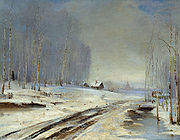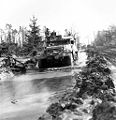- Rasputitsa
-
Rasputitsa, 1894, Alexei Savrasov
 An der Ostfront im Herbst 1941
An der Ostfront im Herbst 1941Rasputiza (russisch распу́тица, Wegelosigkeit) ist die russische Bezeichnung für die Schlammzeit, Schlammperiode bzw. Regenzeit im Frühjahr und Herbst, in der unbefestigte Straßen im östlichen Europa (insbesondere Weißrussland, Russland und Ukraine) durch Schneeschmelze bzw. Regenfälle aufweichen und unbefahrbar werden.
Die Rasputiza behinderte den Vormarsch von Napoleon[1][2], fesselte russische Truppen im russisch-polnischen Krieg von 1831 mehr als einen Monat lang an die Umgebung Warschaus[3], und behinderte ab dem 13. Oktober 1941[4] beide Seiten in der Schlacht um Moskau[5].
Im Ersten Weltkrieg war die Rasputiza bzw. der russische Winter Gegenstand von wissenschaftlichen Artikeln[6] .
Im Finnischen wird der Zustand als rospuutto (Straßenlosigkeit) bezeichnet.
Im Zweiten Weltkrieg traten ähnliche Verhältnisse auch an Abschnitten der Westfront auf:
Im Hürtgenwald 1944
Einzelnachweise
- ↑ [1] FAQ regarding what made Napoleon fail in invading Russia
- ↑ [2] "whilst it was almost impossible to drag the gun-carriages through the half-frozen mud"
- ↑ http://www.ostfront.net/russland/russland_2_01.htm
- ↑ http://www.zeit.de/1991/51/Bis-Chimki?page=4
- ↑ Overy (1997:113–14): "Both sides now struggled in the autumn mud. On October 6 [1941] the first snow had fallen, unusually early. It soon melted, turning the whole landscape into its habitual trackless state – the rasputitsa, literally the ‘time without roads’. ... It is commonplace to attribute the German failure to take Moscow to the sudden change in the weather. While it is certainly true that German progress slowed, it had already been slowing because of the fanatical resistance of Soviet forces and the problem of moving supplies over the long distances through occupied territory. The mud slowed the Soviet build-up also, and hampered the rapid deployment of men and machines."
- ↑ Dr. B. Brandt, in Die Naturwissenschaften: Volume 5, Number 21 / May, 1917, Volume 6, Number 4 / January, 1918
Quelle
- Richard Overy (1997). Russia's War. London: Penguin. ISBN 1-57500-051-2.
Wikimedia Foundation.




